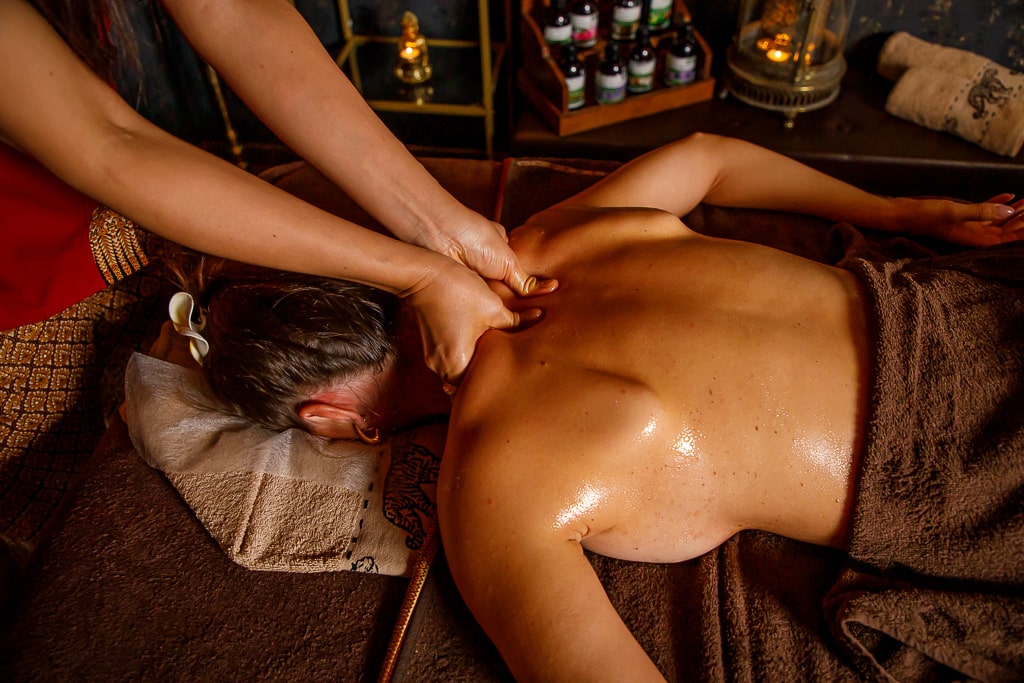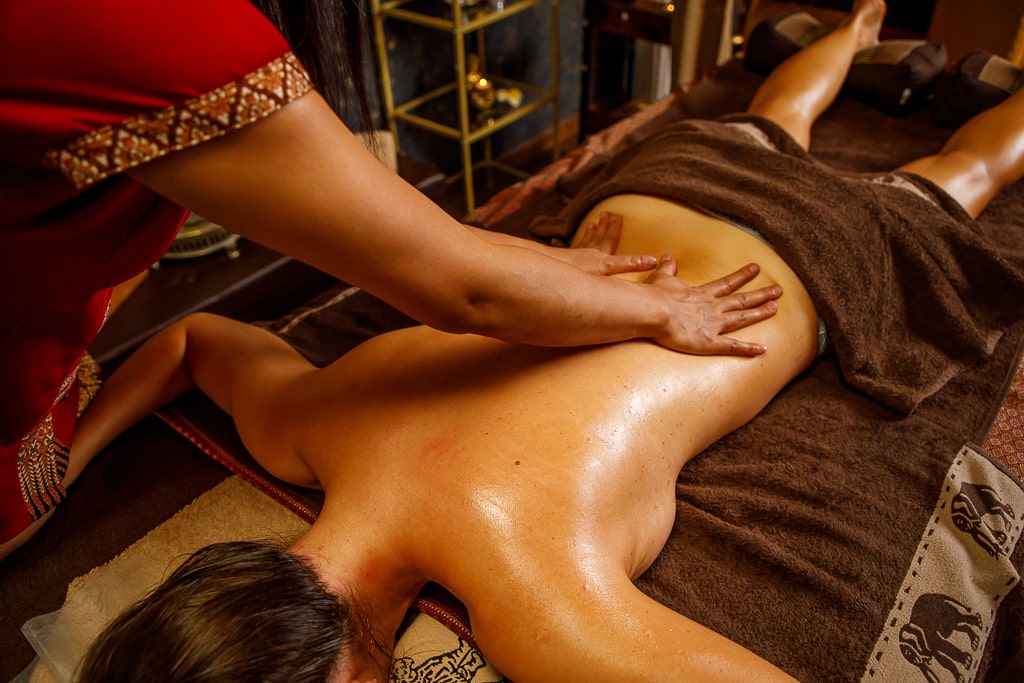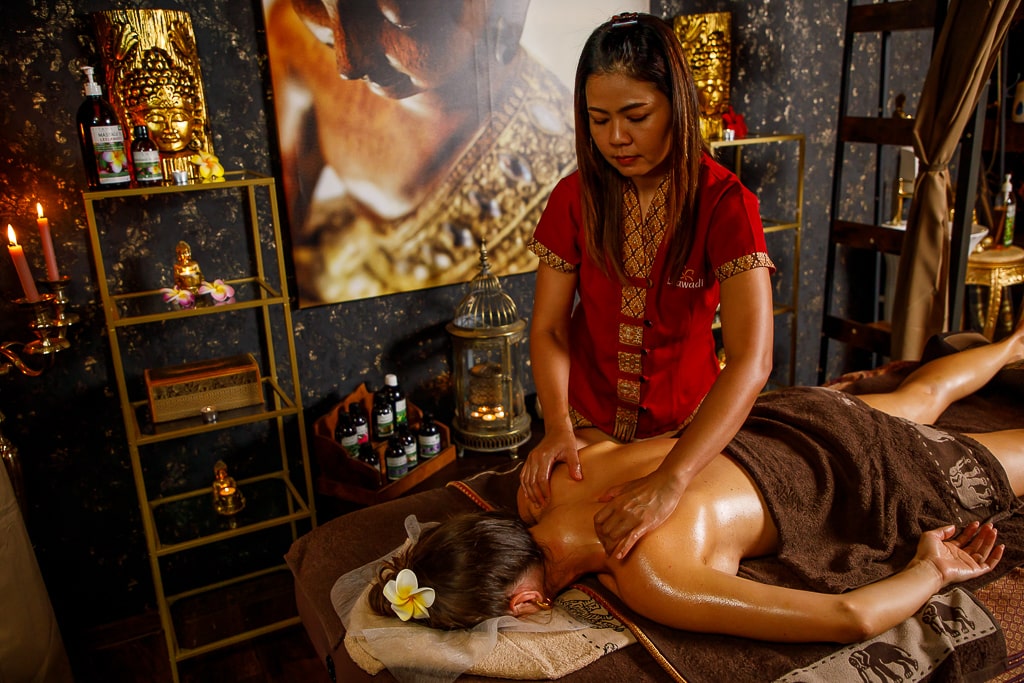Oil massage is a relaxing massage technique that uses warm natural oil to relax muscles, improve blood circulation, and promote overall well-being. It is an ideal way to slow down, regenerate, and treat yourself to quality care for your body and mind.
What is oil massage?
Oil massage is a gentle to moderately intense body massage using warm massage oil. The aim is not only to relax the muscles, but also to hydrate the skin, detoxify and harmonize the body and mind.
Thai oil massage has similar effects to classic oil massage. It is less intense than traditional “dry” Thai massage, but often stronger and more effective than classic relaxation or oil massage. Its goal is to affect the energy pathways in the body – the so-called Sen lines, release tension and improve energy flow.
The use of warm oil serves two purposes. First, it allows for smoother gliding over the skin, allowing the massage therapist to reach deeper layers of muscle and better release hard knots. Second, some massage oils are enriched with essential oils that can offer additional aromatherapy benefits.
The oils used are usually plant-based – coconut, sesame, almond, or jojoba – often enriched with essential oils according to the client’s needs (e.g., lavender for calming or eucalyptus for breathing relief).

During a Thai oil massage, the masseuse combines gentle, gliding movements with acupressure.
The greatest benefits of oil massage
Oil massage serves not only as a remedy for momentary discomfort, but also as a proactive approach to maintaining and improving overall health and well-being. Each of these benefits underscores the holistic nature of oil massage and highlights its ability to heal, rejuvenate, and harmonize the body and mind.
| Benefits | How it helps |
| Relaxation of muscle tension | Relieves stiffness and soreness |
| Improvement of blood and lymph circulation | Supports oxygenation and detoxification of the body |
| Skin hydration and nourishment | Leaves skin soft and supple |
| Reduction of stress and anxiety | Harmonizes the nervous system and induces mental well-being |
| Supporting quality sleep | Massage calms and prepares the body for deep relaxation |
Advantages vs. Disadvantages
In general, the advantages of oil massage outweigh the disadvantages, especially if you choose an experienced massage therapist who uses high-quality oils suitable for your skin type. It is always a good idea to discuss any concerns you may have in advance.
| Advantages | Disadvantages |
| Relaxation and regeneration | Not suitable for certain skin conditions |
| More comfortable and effective massage techniques | People with oily or acne-prone skin may find that oils worsen their skin condition. |
| Better sleep quality | Requires time (min. 60 min) |
| Improved skin appearance | May cause an allergic reaction in some people. |
Practical tip: If you have sensitive skin or allergies, inform the masseuse in advance – the salon will select a suitable hypoallergenic oil for you.
Warning: Oil massage is not suitable for fever, infections, or inflammatory skin diseases.

Oil massage has the ability to heal, rejuvenate and harmonize the body and mind.
The course of an oil massage: What to expect?
If you have never had an oil massage before, you are probably curious about what to expect. Here is a simple overview:
- Initial consultation with the masseuse
The masseuse will ask you about your health, preferences, and any contraindications. - Selection of oils and essences
The appropriate type of oil (relaxation, detox, regeneration, etc.) will be selected according to your needs. - The massage itself
It begins with the application of warm oil. The masseuse works with smooth, gentle strokes all over the body, focusing on the spine, neck, arms, legs, and possibly the abdomen and head. - Final phase
After the massage, leave the oil to work for a while, then wipe off any excess oil or take a shower. We will be happy to provide you with a towel and a place to relax in the salon.
After an oil massage, it is best to rest, but a visit to a wellness center can also do you good. It is ideal to choose warm treatments that promote relaxation, such as a sauna or steam bath. The sauna will help to further relax the muscles that have already been loosened by the massage.
Who is oil massage suitable for?
We recommend oil massage especially for those who:
- feel physically tired, stressed, or tense
- have a sedentary job and stiff muscles
- have dry skin: oils such as coconut oil, jojoba oil, and olive oil deeply moisturize the skin, making it soft and supple.
- suffer from insomnia or anxiety: the relaxing properties of certain oils, such as lavender, can help improve sleep quality.
- are looking for a gentler but effective form of relaxation
Interesting fact: In Ayurveda, oil massage (Abhyanga) is also recommended as part of daily self-care – to promote vitality and longevity.
How to prepare for an oil massage?
- Arrive on time – give yourself time to relax
- Do not eat for 1–2 hours before the massage, or eat only something light
- Wear comfortable clothing
- Drink plenty of water before and after the massage
- Discuss any physical problems, painful areas, or specific needs with your massage therapist







